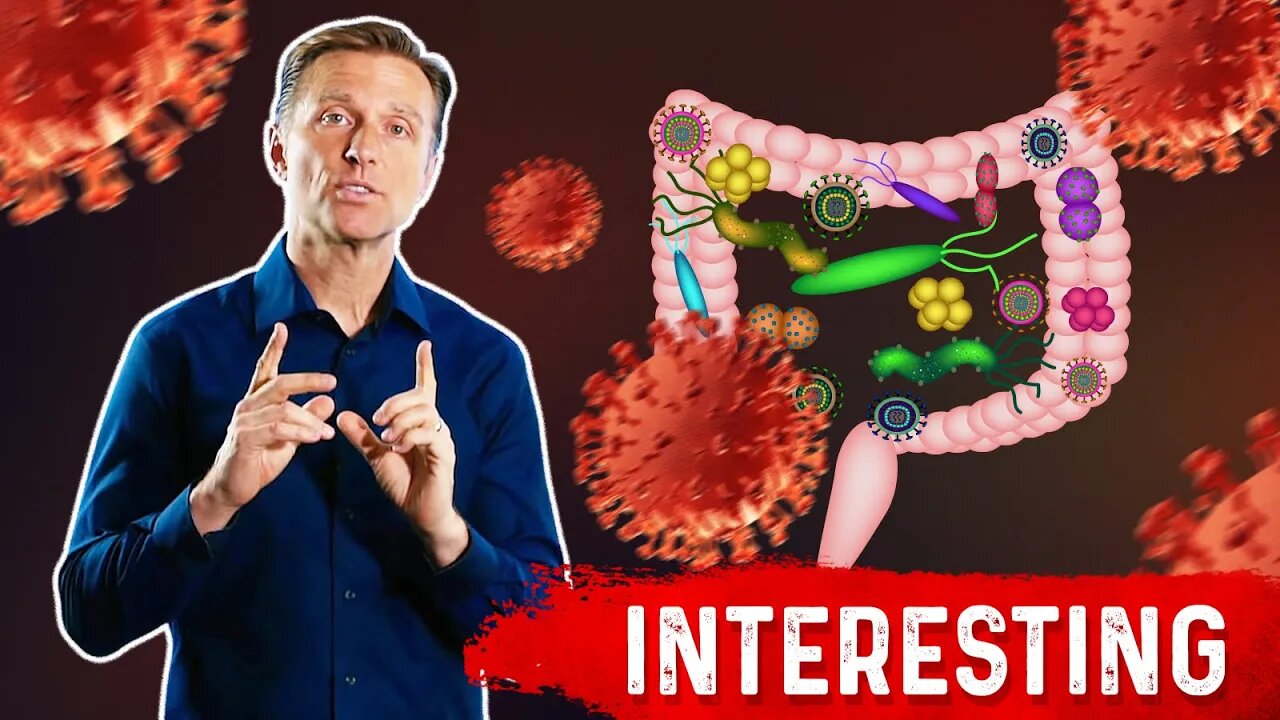Premium Only Content

Gut Bacteria and Viruses
There is a unique relationship between your gut bacteria and viruses. If you want to keep your immune system strong, you need to understand this connection.
DATA:
https://www.ncbi.nlm.nih.gov/pmc/articles/PMC6435874/
Timestamps
0:05 What is the gut microbiome?
0:30 What is VLP?
0:50 Human gut virome
1:32 Gut bacteria and immune system health
1:59 What happens if you lack good bacteria
2:20 What your gut bacteria do
5:25 How to help keep your immune system strong
Today we’re going to talk about the relationship between your gut bacteria and viruses.
What is the gut microbiome?
Your gut microbiome is a combination of good bacteria and bad bacteria, such as:
• Bacteria
• Yeast
• Parasites
• Viruses
There is something called VLP (viral-like particles). You have a lot of these in and around your body. VLPs don’t have any genetics inside of the cell, but they are viral-like particles that exist throughout the body.
The human gut virome is clusters of viruses that live in your body, and there are a lot of them. You have a lot of bacteria in your body, possibly trillions. These viruses outnumber your bacteria by 10:1 and, in some cases, 20:1. These viruses typically don’t cause any problems unless you have lowered resistance or a medical problem that makes you more susceptible. This is why it’s important to keep your immune system strong.
You also have an army of immune cells that include not just white blood cells, but also your good bacteria.
If you’re lacking good bacteria, the bad bacteria can thrive. Also, if you’re eating foods that create a lot of inflammation, the inflammation can create a shift from good bacteria to bad bacteria.
Your good bacteria:
• Maintain the integrity of the intestinal barrier
• Keep inflammation down
• Compete for space and food (they don’t let the bad bacteria have enough space or food to live)
• Directly kill pathogens
• Enhance immunity
• There is a link between the gut bacteria and the respiratory tract
• Recycle and modify bile salts, which are antibacterial
• Has anti-viral properties
How to help keep your immune system strong in relation to your gut bacteria:
• Pathogens love sugar—especially candida (avoid sugar)
• Replenish your good bacteria (take periodic probiotics)
• Consume prebiotics (vegetable fiber)
Talk to a Product Advisor to find the best product for you!
Call 1-540-299-1556 with your questions about Dr. Berg's products. Product Advisors are available Monday through Friday 8am-6pm and Saturday 9am-5pm EST.
* At this time, we no longer offer Keto Consulting and our Product Advisors will only be advising on which product is best for you and advise on how to take them.
Dr. Eric Berg DC Bio:
Dr. Berg, 56 years of age is a chiropractor who specializes in Healthy Ketosis & Intermittent Fasting. He is the author of The New Body Type Guide and other books published by KB Publishing. He has taught students nutrition as an adjunct professor at Howard University. He no longer practices, but focuses on health education through social media.
DR. BERG'S SHOP: https://bit.ly/2Usa0ph
Follow us on FACEBOOK: fb.me/DrEricBerg
Send a Message to his team: m.me/DrEricBerg
ABOUT DR. BERG: https://bit.ly/2Usaeg7
Disclaimer:
Dr. Eric Berg received his Doctor of Chiropractic degree from Palmer College of Chiropractic in 1988. His use of “doctor” or “Dr.” in relation to himself solely refers to that degree. Dr. Berg is a licensed chiropractor in Virginia, California, and Louisiana, but he no longer practices chiropractic in any state and does not see patients so he can focus on educating people as a full time activity, yet he maintains an active license. This video is for general informational purposes only. It should not be used to self-diagnose and it is not a substitute for a medical exam, cure, treatment, diagnosis, and prescription or recommendation. It does not create a doctor-patient relationship between Dr. Berg and you. You should not make any change in your health regimen or diet before first consulting a physician and obtaining a medical exam, diagnosis, and recommendation. Always seek the advice of a physician or other qualified health provider with any questions you may have regarding a medical condition.
Thanks for watching! I hope this video helps you better understand gut bacteria and viruses.
-
 7:15
7:15
Dr. Eric Berg
9 days agoThe Most Dangerous Foods for Your Health (Especially After 50!)
7.74K18 -
 12:40
12:40
Tundra Tactical
13 hours ago $1.19 earnedGEN Z Brit 3D Prints a WORKING Gun Pt.2!
14.9K7 -
 10:45
10:45
The Rich Dad Channel
19 hours agoWhy Working Hard Will Keep You Poor (Unless You Do This)
11.4K2 -
 16:32
16:32
Melonie Mac
15 hours agoPhoebe Waller Bridge fails to deliver Tomb Raider script
16.8K4 -
 17:19
17:19
ARFCOM Reviews
18 hours ago $0.55 earnedComplete SI Pistol Build | Strike Arms Compact Pistol
12.3K1 -
 1:08:43
1:08:43
MTNTOUGH Fitness Lab
14 hours agoInside the WILDEST Career Switch: How a Ballroom Dancer Conquered the Hunting World
18.1K4 -
 26:57
26:57
Uncommon Sense In Current Times
15 hours ago $0.53 earnedDefending Your Christianity Without Overcomplicating It (Part 1) | Greg Koukl
14.8K3 -
 52:58
52:58
State of the Second Podcast
13 hours agoThe Unfiltered HONEST Truth About the Firearms Community (ft. Whiskey & Windage)
17.2K4 -
 2:22:54
2:22:54
Badlands Media
14 hours agoBad Friends Ep. 1: In the Beginning Was the Word... and a Lot of Chaos
87.1K72 -
 2:57:33
2:57:33
TimcastIRL
12 hours agoFBI CAUGHT Rigging 2020 Election, Leaked Chat Logs PROVE COVER UP w/Michael Malice | Timcast IRL
276K221